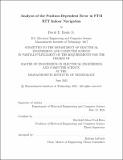Analysis of the Position-Dependent Error in FTM RTT Indoor Navigation
Author(s)
Houle, David E.
DownloadThesis PDF (9.845Mb)
Advisor
Horn, Berthold Klaus Paul
Terms of use
Metadata
Show full item recordAbstract
Fine time measurement (FTM) of the round-trip time (RTT) of a signal between an initiator (smartphone) and a responder (Wi-Fi access point) provides a promising method for indoor positioning. Accurate indoor positioning is a requirement for a wide range of applications, such as asset tracking, indoor navigation, and contact tracing. Unfortunately, the error of reported FTM RTT distance measurements has been shown to have a standard deviation that ranges from 1-2 meters in ideal setups. A major FTM RTT error source was discovered and coined as the “position-dependent error”. This error is heavily depend on the position of an initiator relative to a responder, with the reported measurement fluctuating by meters from an initiator position change of millimeters. Using an Android app and a CNC machine for 2D and 3D positioning, these unusual error properties are explored in depth through experimentation. This experimentation includes evaluating the position-dependent error in both the spatial and frequency domains when varying the test setup, using different smartphones and Wi-Fi access points, and changing the bandwidth and central frequency of the Wi-Fi access points. Possible causes of the position-dependent error are analyzed, such as inaccurate time of arrival or super-resolution algorithms, a dependence on received signal strength, and clock instability. In the end, recommendations for error amelioration are made, and the future of FTM RTT is discussed.
Date issued
2021-06Department
Massachusetts Institute of Technology. Department of Electrical Engineering and Computer SciencePublisher
Massachusetts Institute of Technology